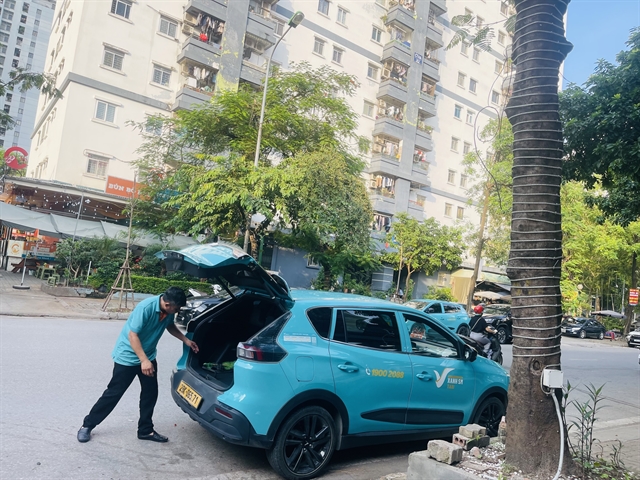

Last week, Việt Nam News asked its readers if they could spot fake news from genuine news.
Last week, Việt Nam News asked its readers if they could spot fake news from genuine news.
Here are some of the responses:
Cao Loan, a reader
Today it seems that people can’t live without the Internet and we can’t deny its role in our lives, from updating news, shopping online to socialising with friends, etc. However, the boom of online magazines, newspapers, and journals has confused readers about the authenticity of news released from these sources. So how can you spot fake news when you read online? Here are some of my suggestions.
First, choose prestigious websites to visit. These sites may be state-run or private but I think they are quite official and reliable sources.
Second, be alert for images or videos released on the Internet because they may be unreal. Sometimes they are invented to hunt “likes” from the viewers. You can verify their authenticity by googling the names or the events mentioned. Often, hot or breaking news is delivered across many sites, not just one.
Last but not least, pay attention to every single sound and image effect when you watch a video or look at a photo online. Videos and photos, which are the work of photoshop technology, are not very difficult to recognise because they look quite unnatural.
Jacob O Gold, American, Chicago
During US election season this year, “fake news” was unfortunately able to circulate at an unprecedented rate because of the nature of the “real” stories surrounding both candidates, combined with the seeming inability of the “mainstream media” to cover those stories. This was a shortcoming that was particularly true and partially an impression created by both campaigns in order to deal with candidates respective “scandals”.
Add unprecedented leaks of information to the mix and, toward the end of the campaign, the most shocking headlines became just believable enough to click on… There is “good news” and “bad news” about fake news. The “good news” is that fake news is relatively easy to detect. By checking the source where the piece originally appeared, as well as the growing number of fact-checking websites that have sprouted up in response to fake news, you can identify fake news fairly easily. Similar to scam emails, fake news stories are usually poorly written or contain styles of non-journalistic language that purposely signal fakeness to clever readers while roping in more impressionable, less-informed readers. The more you read, the easier it is to spot fake news.
The “bad news” is that there are many, many of these impressionable readers online, and that most of the time, those who read and even recirculate fake news do so in the full knowledge that the story they are reading is wholly or partially untrue - as long as it fits their partisan politics. Computer systems will soon be able to pre-review and “label” news articles based on their source, original posting data, truth ratings from fact checking websites, and other factors. The more problematic question is what to do next. The real problem is not fake news that plays to political extremes; it’s the fact that citizens have to navigate internet spaces that have become bitterly divided, rancorous partisan battlegrounds.
Nguyễn Ngọc Lan, Hà Nội
In the booming era of internet and social networks, people can access many sources of information. Sometimes, the amount of news is overwhelming. Like many young people, I rarely read the newspaper for news. I just scan through the news on facebook when I get up in the morning. Thus, it is difficult for an ordinary person to spot which news stories are correct or not. Whenever there were hot issues occurring in society, my facebook account was bombarded with news updates every hour. I felt annoyed at this, so I didn’t care to distinguish what news was true or false.
Jonathan Wong, a reader
Social media has been one of the greatest inventions of this generation. It has connected all of us like never before, giving everyone a voice that crosses boundaries and has become a powerful source of information.
Yet therein lays a problem with this brave new world. Information, or disinformation, is everywhere and is overwhelming.
News articles regularly appear on my Facebook and Twitter app but it is not always easy to tell what is real and what has been fabricated.
One easy way is of course to look at the source. Sites like the New York Times, the Guardian and the Economist still retain their credibility and I am less wary about absorbing their content.
The problem is that such sources are few and far between.
Nowadays, there are thousands of alternative news sites, many with a clear agenda, political or financial, and the lines between what is news and entertainment is blurred.
When 100 articles tell you the Earth is flat, it’s easy to dismiss it. When 1,000 articles say the same thing, it becomes harder to ignore.
For me, I always try to keep an open mind about what I read. If it sounds suspicious, I usually do some research, on Google, to challenge whatever I’m reading and that usually helps separate fact and fiction.
It’s not always foolproof but I have found it to be a good way when reading the news. Hopefully more people will view whatever they read with a more critical mind.
Andrew Burden, Canadian, Hà Nội
Being able to spot fake news is trickier than it sounds. Anyone can create a website and cut and paste real information combined with lies. Trustworthy legitimate newspapers and magazines are generally exempt.
I follow quality sources and rely on established authors and journalists. At university I wrote for the student newspaper. I have interviewed the mayor, the chief of police and even a really famous movie star.
Ironically, not once was I ever challenged to show ID or provide my editor’s name and number. I was able to open many doors and ask a lot of questions just showing up with a pen and notepad. I wrote a 2 page feature about a ride along with police, fire and ambulance gaining access everywhere.
Journalists in theory are professionals with strong ethics, but we are all biased and ignorant about many things. It is said that doctors bury their mistakes and lawyers send their mistakes to jail. Don’t trust everything you read or watch.
It is crucial to lock your doors, keep strong passwords on the internet and compare and contrast various news sources. Buyers beware, keep your receipt and don’t judge a book by its cover. The same thing applies to the news. — VNS




